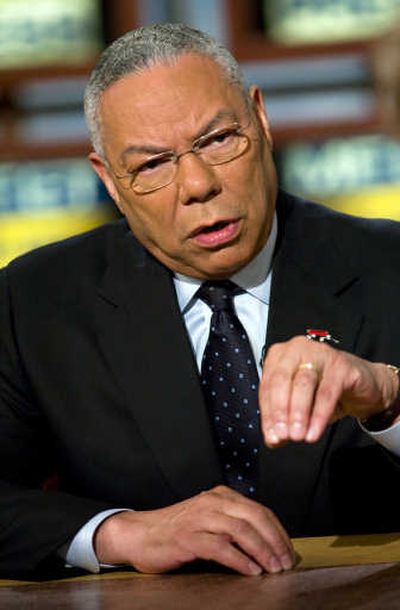Powell urges closure of Guantanamo

WASHINGTON – Former Secretary of State Colin Powell called Sunday for closing the prison at Guantanamo Bay, Cuba, and rethinking the “don’t ask, don’t tell” policy he initiated as head of the Joint Chiefs of Staff. The public comments represent Powell’s effort to further distance himself from the Bush administration he once served.
A key architect of the Pentagon’s policy on homosexual troops, Powell said the country “is moving away” from the attitudes about gay people it had in 1993, when the policy was adopted. But he stopped short of calling for a redesign while the country is “at war.”
Appearing on NBC’s “Meet the Press,” Powell urged that the military commission system for accused terrorists be scrapped and detainees at Guantanamo be taken to the United States and handled through the federal justice system. The United States continues to hold about 380 persons in the detention center, despite the complaints of human-rights advocates and other foreign and domestic critics. Their continued imprisonment, he said, has “shaken the belief of the world in America’s justice system.”
Responding to defenders of the system who are reluctant to allow detainees access to lawyers and judicial protections, Powell said, “So what? Let them. … America, unfortunately, has 2 million people in jail, all of whom had lawyers and access to writs of habeas corpus. … We can handle bad people in our system.”
With authoritarian world leaders citing Guantanamo to “hide their own misdeeds,” he said, Guantanamo “is causing us far more damage than any good we get from it.”
Powell was chairman of the Joint Chiefs of Staff when President Clinton began devising the military policy on gays. Called “don’t ask, don’t tell,” the policy was intended to allow homosexuals to serve in the military only as long as they did not disclose or act on their orientation. In recent weeks, the issue has come alive because Democratic presidential candidates are urging the policy be jettisoned.
Powell said the policy was “an appropriate response to the situation back in 1993. And the country certainly has changed.”
At debates in New Hampshire last week, all the Democratic candidates said it was time to move on from the policy, while none of the GOP candidates expressed that view.